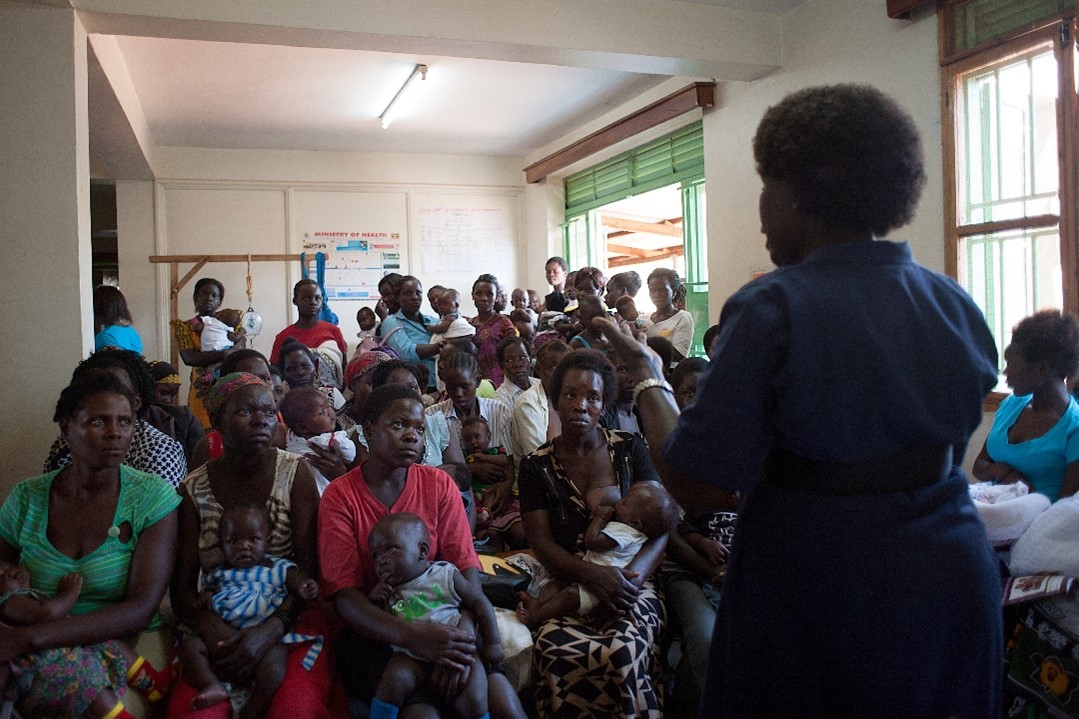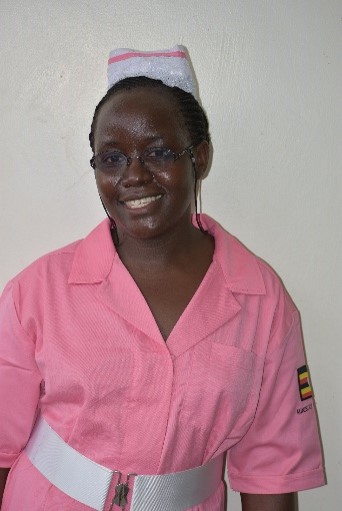
How a midwife in Uganda is helping young mothers and babies during the pandemic baby boom

Photo: A nurse speaks to a group of women and children at a vaccination event at Gulu Independent Hospital, Uganda. Uganda’s Integrated Child Health Days offer an opportunity to reach women and children with a wide array of lifesaving services. PATH/Will Boase
Esther Alamia is a midwife and a focal point person for the Baby-Friendly Health Facility initiative at Busiu HCIV, Mbale district, Eastern Uganda. She is used to delivering a lot of babies, but 2021 has brought an unprecedented volume to her health center. The recent “baby boom” in Uganda has been attributed to the COVID-19 lockdown and resulting lack of access to family planning tools and services. Young women and girls have been especially affected. She notes,
“From January this year, we have seen a dramatic increase in deliveries, which may be attributed to COVID-19 lockdown last year. On average, we attend to 50 pregnant mothers in our antenatal clinic and of these, nearly half are teenagers below the age of 18.”
 Esther Alamia is a midwife in Mbale District, Uganda.As a midwife who is passionate about saving the life of every mother and their baby, Esther knows that women’s health is inseparable from children’s health. She says that Uganda’s recent effort to “package” vaccination clinics with other essential services offers an opportunity to ramp up immunization services for all babies who have been born because of the COVID-19 baby boom. She actively advocates for the integration of antenatal services into routine outreach immunization services, as she hopes that this integration will help take services closer to teenage mothers who believe they will experience stigma and discrimination at prenatal clinics. Esther shares one story that stuck with her:
Esther Alamia is a midwife in Mbale District, Uganda.As a midwife who is passionate about saving the life of every mother and their baby, Esther knows that women’s health is inseparable from children’s health. She says that Uganda’s recent effort to “package” vaccination clinics with other essential services offers an opportunity to ramp up immunization services for all babies who have been born because of the COVID-19 baby boom. She actively advocates for the integration of antenatal services into routine outreach immunization services, as she hopes that this integration will help take services closer to teenage mothers who believe they will experience stigma and discrimination at prenatal clinics. Esther shares one story that stuck with her:
“We have young mothers who fear to visit health facilities, like one 14-year-old girl whom I helped to deliver her baby. She had never attended any antenatal care clinic throughout her pregnancy. She only came for delivery after her membranes raptured. She told me she could never come to the facility because she detested the idea of old people seeing her in the line with old women. Fortunately, she delivered a baby boy, although underweight at 1.3 kilogram.”
Midwives like Esther play an essential role in saving the lives of babies and mothers, improving health, and strengthening health systems. According to the International Confederation of Midwives, increased investment in midwives could save up to 4.3 million lives every year by averting 67% of maternal deaths, 64% of neonatal deaths, and 65% of stillbirths.


